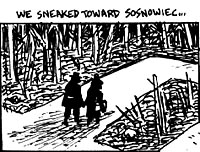
I am really glad that we were able to read "A Lesson from the Holocaust: Bystander to Advocate in the Classroom." This article has made me look at the Holocaust, and other sensitive subjects, in a new light. I have had many lessons on the Holocaust, yet I was still surprised at how my emotions can create such a stronger connection to the literature that I read. In presenting this topic, one key is to allow yourself, as the teacher, to be vulnerable. This is not as easy as it seems. I am being the group leader for this article, and I have found myself asking "How are the students (you guys!) going to respond to me?" and "Are you going to be able to/ willing to make strong emotional connections as well?" I shall wait and see!...
I definitely agree in that we need to take several steps away from apathy and many towards empathy. In doing this, a greater understanding and appreciation will arise between our students and literature. Also, if we are examples of these emotional connections within our writing, our students will be encouraged to do the same in their writing.
Some of the methods that we have looked at so far, that I would like to implement in my classroom would be literature circles, graphic novels, reflective writing, and using images. Literature circles are so beneficial in that they provide for independent work as well as group work. Students are able to read independently and then get in groups to discuss their reading (there are other options of doing lit circles, this just being one of them!). Also, student choice is a key factor in this method, which I like. I think that students are more apt to engage in something that they have some sort of say over... Graphic novels allow students to know that there are other options for reading and writing, than novels. I don't think that we should get ride of the novel genre altogether, but I would like to add some graphic novels into my classroom. These incorporate visual aids as well as written words, which as a combination assist in understanding... I really like the idea of reflective writing, which has come up in a few of my blogs. I think that writing needs to be valued over speaking/discussion, sometimes. For instance, in "A Lesson" the author said that she offered her vulnerable writing and then asked the class a question. The students were speechless. She decided that that moment would be better suited for writing, rather than verbal discussion. I also like that with writing, those who are more shy or less willing to voice their thoughts, are able to do so easier on paper than not... Using images can be a powerful asset to teaching. They can be used for a plethora of things as well. I am fascinated with the idea of presenting pictures, then asking students to narrate the picture. Also, something that may be interesting is to have students act out the picture (like act a certain way that the person looks like they'd act, or have a picture from a certain scene in a piece of literature that your students have read and have them act this out.). Adding these methods and approaches to teaching would be interesting as well. Maybe have one literature circle focus on a graphic novel that has minimal words, then have each group perform the novel as some sort of drama? Hmmm...



I have never read Maus and even through you said the ending, it makes me want to read it. I think that teachers reviewing and giving their opinions on books could be really important because it make the student think "What is so great(or terrible) about this book?"
ReplyDeleteI also liked how the teacher in "A Lesson" allowed for students to express themselves freer. If you don't like how you worded something, it's easy to cross it off or erase it from writing. It is impossible to say something and take it back, so students might not want to verbally share ideas because they feel they could be "wrong."
yes! I agree. I just wrote a blog on here and one section addresses that "students might not want to verbally share ideas because they could be 'wrong'." I think that we have to have this mentality that everyone's idea, thought, feeling, etc, are important and note worthy. Then, when we have this thought, we can bring that to the class, and have the atmosphere in which it is free and open in the sense that our students will feel that it's OK to share their ideas...
ReplyDeleteI also never read Maus and after reading this post I find myself now wanting to go out and find this book on the shelves I feel like it is a novel that definitely needs to be in my classroom library.
ReplyDelete